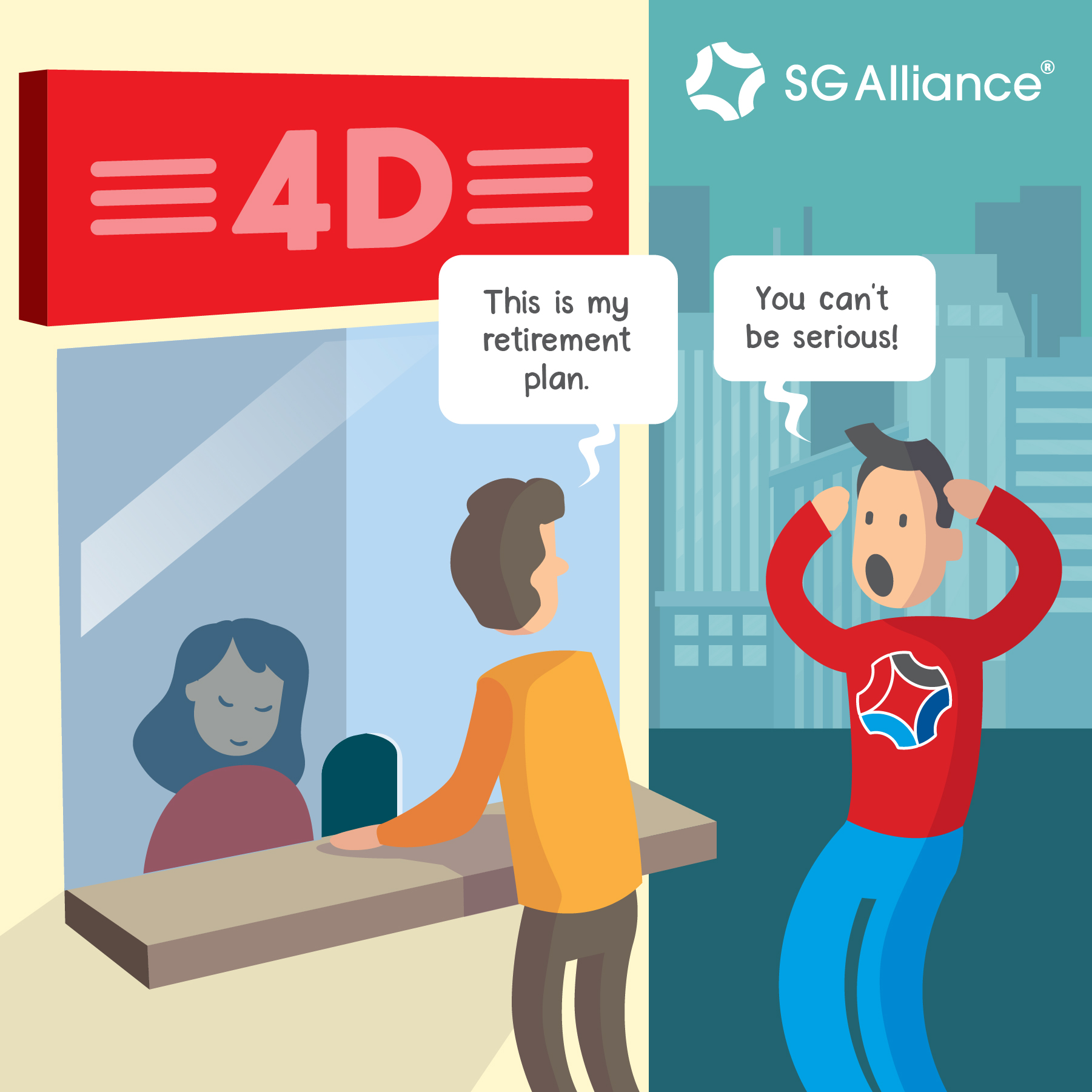
“The best time to start planning and taking action for your retirement was 20 years ago. The next best time is now.” – Kenny Tey
When we are young and busy with life, growing old isn’t something we make time to think about. In fact, if you ask Singaporeans about their future financial plans, 1 in 3 are concerned about not having saved enough to enjoy a comfortable retirement, and as high as 45% haven’t even begun to create a retirement fund1.
Retirement preparedness has become a growing concern among Singaporeans. Ideally, a good retirement plan involves earning and saving today, to live a comfortable tomorrow. If preparing for your golden years is on your mind, here are 8 top mistakes to avoid in your retirement planning:
As the well-known saying goes, “Failing to plan is planning to fail.” Many folks, especially those who are financially contented in their present life stage, make the mistake of assuming that they will magically have enough funds to last their entire old age. These days, with people living longer, we could be talking about a period of 20 to 30 years or even more of life when we are no longer earning active income. Without figuring out what kind of expenses you might need to match the lifestyle you plan, it’s hard to know if you have enough. The costly risk of not having enough could mean that you will have to depend on your loved ones to cover your needs and wants. Imagine the relationship strain that can come with that path. Plus, do you really want to weigh down those who will step in to provide for you knowing they too will have their own commitments? Planning ahead helps you set your retirement goals, and prepare for all the inflated costs and unexpected events that might come your way.
If you’re thinking of crossing the retirement savings bridge when you get to it, think again. A prime mistake many Singaporeans make is not starting their retirement savings early. I believe the earlier you start planning and saving for your later years, the better your returns will be in the long run. By underestimating your retirement needs, you could be forced to continue working for longer, which can put your retirement years in jeopardy.
Many people, even in their 30s and 40s, don’t start thinking about their retirement plans. However, the longer one takes to start saving, the steeper their journey to achieve their financial goals at retirement. The sooner you commit to setting aside a fixed monthly amount in savings, the longer time your money will be put to enjoying higher compounded returns for your future. Time is an expensive thing to waste.
Let’s take an example where an individual starts saving 20 years from their planned retirement age, targeting a goal of $1,000,000 at an average rate of return (ROR) of 5% p.a:
| If you start X year(s) later, | you will have to save X% more than the original amount over the rest of your years until retirement |
| 1 | 8% |
| 5 | 54% |
| 10 | 165% |
As you can see from the table above, the cost of delay or postponement of retirement savings can be more serious than the risk of inflation. Starting just one year later can cause you to have to save 8% more with every passing year of delay.
| Years to Retirement = 20 years | ||||
| Assumed ROR = 5% p.a. | ||||
| Start Saving | No. of Years Left to Save | Target Amount | Amount to Save Monthly | How Much More Do I Need to Save |
| now | 20 | $1,000,000 | $2,423 | NA |
| 1 yr later | 19 | $2,625 | 8% | |
| 2 yr later | 18 | $2,852 | 18% | |
| 3 yr later | 17 | $3,107 | 28% | |
| 4 yr later | 16 | $3,396 | 40% | |
| 5 yr later | 15 | $3,726 | 54% | |
| 6 yr later | 14 | $4,105 | 69% | |
| 7 yr later | 13 | $4,545 | 88% | |
| 8 yr later | 12 | $5,061 | 109% | |
| 9 yr later | 11 | $5,674 | 134% | |
| 10 yr later | 10 | $6,413 | 165% | |
Singaporeans have access to their CPF upon retirement2. The CPF available to an individual depends on their employer’s contributions during the course of their employed years. As the latest national Household Expenditure Survey 2017/2018 reveals, retiree households living in HDB flats in Singapore receive an average of S$1,5223 per month for their retirement needs, the bulk of which comes from family support. Income from CPF contributes about S$280 per month, just over 18% of the total average sum. It is clear that CPF alone will not be enough to cover even the simplest of retiree household’s spending needs. It is a smart idea to plan ahead so that you can cover shortfalls in your savings targets with other sources of income.
Saving for retirement is possible when we are given the time and capability to earn. But sometimes, this capability can be unexpectedly taken away, such as when one suddenly falls critically ill or becomes disabled. If you suddenly become unable to generate an income even to cover daily expenses, your savings for retirement will naturally also fall off track.
It is very important to have a well-covered insurance portfolio to protect our earning capability during our working years. Critical Illness Insurance and the addition of Critical Illness Premium Waiver (Rider) in your Retirement Policy are just some steps you can take to protect yourself. The benefits of these insurance products will take over the “job” to save for your years ahead.
You might have heard from your elders what a hot bowl of noodle soup costs 50 years ago. Today, you can’t get the same price of noodles 50 years ago. When estimating retirement needs, the risk of inflation or the increase in the costs of living over the years, also needs to be considered. Financial professionals can help you adjust for inflation by distributing income across a wide selection of investments, to account for higher returns that will beat inflation rates as you continue to save over the long term.
What is the cost of failing to consider inflation? If we want to reach a goal of $1,000,000 for retirement 20 years before the intended retirement age without considering inflation, we may be underestimating our needs by 45% (assuming an actual 3% inflation). In this case, inflation can take away almost half of the value of your money saved today. So, it’s good to remember that money we save is depreciating in value; the $10 you have today will buy you much less in the future.
There are many self-proclaimed investment experts in the marketplace. Some of them could be our friends, colleagues and even family members. Investment decisions should always be backed by detailed understanding, research and analysis, not only of the company but also of the environment.
If you are young and have a longer runway to achieve your savings goals, you have the leeway to take more aggressive approaches to engage in riskier assets. However, as we approach retirement age, we should consider safer options.
There are different products in the market that allow us to save for our retirement, for example, Bank deposits, Endowment plans and Investment in different Unit Trust Funds, Shares, Bonds etc. Different products carry different risks and returns. It’s a good idea to spread your risk, however, here are three undesirable approaches to investing for your retirement:
1) Being too conservative and keeping everything in bank savings account. This approach is considered safe, but it actually carries the risk of depreciating the value of your savings due to inflation.
2) Being too aggressive and investing all your savings into high-risk instruments like derivatives and cryptocurrency.
3) Investing in unregulated products and risking being left with nothing. It’s not uncommon to see such things happening and reported in the news. These are usually the result of a combination of greed and ignorance.
During retirement planning, most people factor expenses associated with holidays, hobbies, daily living, entertainment, social life, and legacy. However, seldom do people plan for future medical expenses, including medical insurance expenses, or any other unpleasant contingencies that may arise. Medical insurance premiums tend to increase as we age, easily going beyond a few thousand dollars for a comprehensive coverage that includes private hospital care. Multiplying that by the number of our retiring years can add up to hundreds of thousands. If these expenses are not prepared for, you could be derailing your retirement plan.
Many Singaporeans find themselves continuing to financially struggle during their ‘golden years’. This is because debt repayments continue to burden them, long after they have stopped earning a regular income. Ideally, one should be debt-free by the time their retirement begins. Consult a financial consultant to help you in budgeting to achieve debt-free status well before your retirement.
Building a good retirement plan requires time, patience, and a thorough assessment of your income and savings capability. At SG Alliance, we want you to achieve your retirement goals by helping you plan for your golden years. If you would like the help of a retirement planning specialist, I am more than happy to meet you for a complimentary consultation.
1Source: https://finance.yahoo.com/news/1-3-singaporeans-worried-retirement-094700601.html
2Source: https://www.cpf.gov.sg/content/dam/web/member/retirement-income/documents/CPF_Retirement_Planning_Booklet.pdf
3Source: https://www.todayonline.com/big-read/big-read-dreaded-r-word-why-singaporeans-need-start-thinking-seriously-about-retirement
